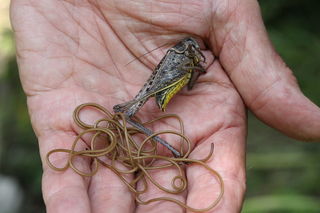Coronavirus Disease 2019
Zombie Movies, Aliens, and Outbreak
What's the evolutionary explanation for zombie movies?
Posted March 23, 2020
My son and I visited a supermarket fairly late in the evening a few nights ago. The shelves were so empty, it was hard to tell if you were actually in the aisle you thought you were in. There was nothing you could bake in the baking aisle. The milk aisle had zero boxes of milk. I don't eat meat, but the meat section was meat-free, at last.
There were only a few other customers walking this deserted landscape. No one talked with anyone else. We all kept our distance, giving one another looks of distrust. It was basically a zombie movie, where everyone expects the other person to reveal their true identity at any moment and share the disease.

Most things, biological and psychological, eventually, at some level, should succumb to an evolutionary explanation. Popular horror movie genres should, therefore, tap into some kind of evolutionary fear. Godzilla movies, for example, are basically predator movies, like Jurassic Park and, well, Predator.
What's the evolutionary explanation for zombie movies? A trip to the supermarket late at night makes that all too clear. They're disease movies. Better yet, they're disease-predator movies.1
The zombie-eyed stares my son and I were getting from at least a few of the other customers were all that I needed to feel this in my bones. Movies like Contagion, Dawn of the Dead, Outbreak, and World War Z all mixed together in my head as my son and I laughed our way through this late-night wasteland. And though this antiseptic world of the empty supermarket was one kind of landscape, it wasn't hard to imagine that somewhere in our evolutionary past, our ancestors stumbled into villages of rotting tribesmen.
Our ancestors who did this got the hell out of there. Our almost-ancestors, the ones who failed to run the hell away, were more likely to succumb to the disease and, therefore, to not be our ancestors. You know, because they died.
COVID-19 seems to bring this all into a visceral focus. I mean, it really has a lot to offer our inner psycho-thriller imaginations.
COVID-19 has another fascinating parallel with disease-predator movies. Zooming out from our late-night visit to the supermarket, our nation's responses to COVID-19 are an insider look into how we might imagine them responding to an alien invasion.
The first aliens land in Wuhan. As information leaks out of Wuhan, we all imagine it's a kind of hoax. It's a bit like the chemical weapons attack in Douma, Syria, where the rebels claimed it was the Syrian army, and Syria and Russia claimed the attack was staged, and then a mighty payload of online hecklers and looky-loos so distorted the picture with their own opinions that it became impossible to tell anything until the dust had cleared.2 To most of us, the invasion of Wuhan by aliens would just look like another weird social media event.
And then as the evidence started to accumulate that there was actually something otherwordly in Wuhan, China would start to lock down parts of its own state. But perhaps the early alien scouts sent to Wuhan simply had to send a signal back to the mother-ship to let them know, "Yeah, there's food down here, lots of it, and it's harmless." So by the time China and the rest of us start to really figure out what's going on, these creatures have already started to make landfall in other parts of the world.
Our somewhat diverse governments naturally take different actions. More bottom-up democratic nations start with a nudge. "Be careful." "Wash the aliens off your hands." And as that doesn't work, they slowly ramp up the aggressive-control measures until they eventually send the military out in the streets. More top-down nations start a little further along the aggression-control ladder. But they all move towards the same national deer-in-the-headlights paralysis.
The front line in these pandemic-unknowns will not be military, though. It will be scientists working in national medical centers or DARPA equivalents, and we'll be shooting the zombie-aliens-disease-predators with every weapon we can imagine. Like a cat trapped in Thorndike's puzzle box, where the only solution is to flail at the unknown mechanisms until we happen to hit on the right combination, our scientific soldiers will embark on a campaign of professionally-informed guesswork.
But none of our nations knows now what to do with aliens or zombies or COVID-19. It's all an experiment in social engineering with a fairly unknown enemy. The reason it's an experiment in social engineering is that in each case, you and I, the hosts, aid the disease-predators by our actions.
And this brings us to the coolest disease-predators we are ever likely to see: the ones that alter our behavior to make sure we infect others. There are so many beautiful examples of this in Earth's animal kingdom. "Zombie ants" infected by the pathogenic fungus Ophiocordyceps unilateralis move to the humid forest floor and attach themselves to the underside of leaves, where spores then explode out of their heads and grow more fungus. Crickets infected by hairworms throw themselves into the water, where they drown and then release their hairworm spawn into the water. The list is long and even includes human-behavior-manipulating parasites, such as Toxoplasmosis, which can influence our risk-taking behavior and aggression.

It is frankly hard to imagine that in some world, perhaps ours, infected people become the hand-puppets of their virus overlords. Oh, wait, I already mentioned Toxoplasmosis. So there's that.
It wouldn't be that far-fetched for us to discover that COVID-19 or some future virus manipulated people during early infection to be just a bit more friendly, a bit more extroverted, a bit more likely to share a meal or a drink with a friend. This would, of course, be the deadliest kind of virus. It would be the virus that actually turns us into zombies.
References
1In brass-tacks biological resources sense, viruses are predators.
2More details on these atrocities here: https://en.wikipedia.org/wiki/Douma_chemical_attack And if you'd like even more information about the rising tide in state-sponsored misinformation, This is not propaganda, by Peter Pomerantsev is brilliant.
Heil, M. (2016). Host manipulation by parasites: cases, patterns, and remaining doubts. Frontiers in Ecology and Evolution, 4, 80.




